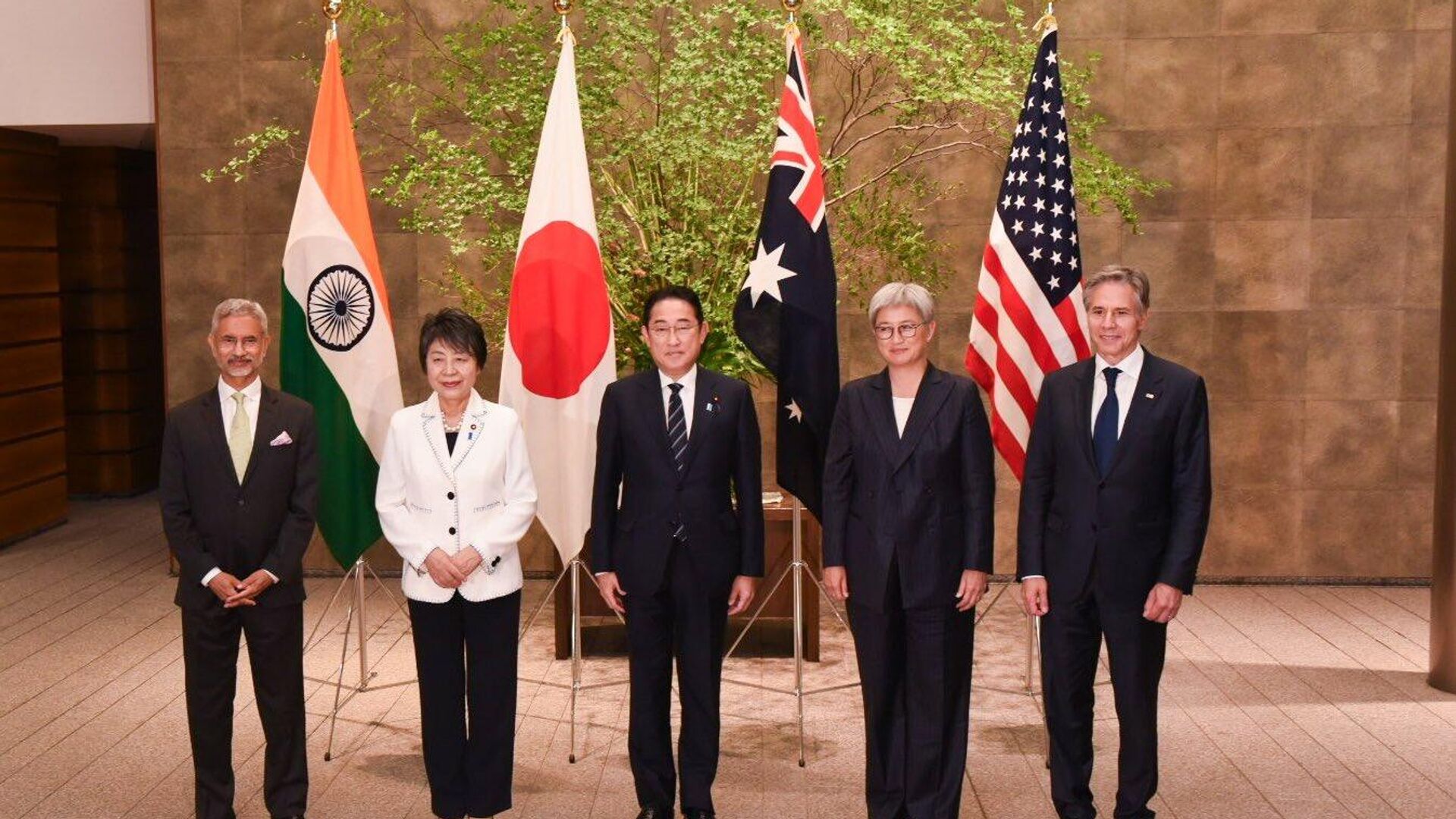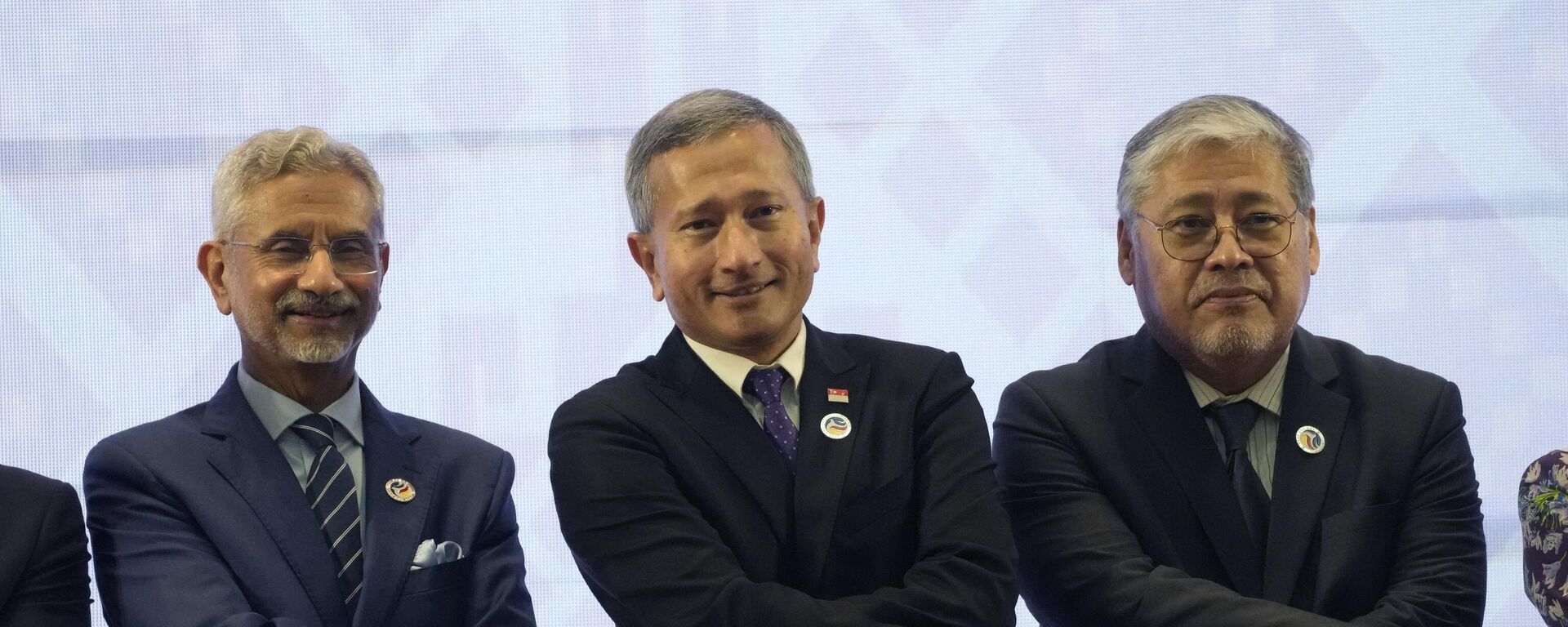https://sputniknews.in/20240729/us-uses-quad-to-keep-its-global-hegemony-intact-ex-envoy-7930593.html
US Uses Quad to Keep Its Global Hegemony Intact: Ex-Envoy
US Uses Quad to Keep Its Global Hegemony Intact: Ex-Envoy
Sputnik India
Quad is one of the instruments being used by the US to keep its "global hegemony" intact, which is a core concern of policymakers in Washington, according to a former Indian diplomat.
2024-07-29T19:45+0530
2024-07-29T19:45+0530
2024-07-29T19:45+0530
s. jaishankar
joe biden
narendra modi
india
us
new delhi
aukus
quad
wang yi
south asia
https://cdn1.img.sputniknews.in/img/07e8/07/1d/7931916_0:158:1348:916_1920x0_80_0_0_12bcd3d49f9bb35757a7c9bf6e5f8226.jpg
Quad is one of the instruments being used by the US to keep its "global hegemony" intact, which is a core concern of policymakers in Washington, according to a former Indian diplomat.Ambassador (Retired) Talmiz Ahmad, a former Indian envoy to Saudi Arabia, Oman and the UAE, told Sputnik India on Monday that Washington has been making consistent efforts to make India a formal ally under the US-led alliance system, like is the case with other Quad partners like Australia and Japan."I believe that all the regional countries, except those that are part of the US alliance framework, are opposed to Euro-Atlantic expansionist policies in the Indo-Pacific region," stated Ahmad.Significantly, Biden's National Security Strategy published in 2022 described China as “America’s most consequential geopolitical challenge”, while vowing to build the "strongest possible coalitions to advance and defend a world that is free, open, prosperous, and secure".On Quad’s Role in Indian Foreign PolicyCommenting on the role of Quad in Indian foreign policy, Ahmad opined that Quad had all but become irrelevant for India in terms of its security value.The former diplomat stated that New Delhi charted a course correction on its outlook towards the Quad following the eruption of the Ladakh border dispute in April-May 2020. He underscored that the western allies were aware of New Delhi's position, which is why they floated the AUKUS framework.More recently, on Sunday, the top defence officials from US, Japan and South Korea signed a pact to institutionalise their defence cooperation to “contribute to peace and stability on the Korean Peninsula, in the Indo-Pacific region, and beyond,” according to a trilateral statement.Ahmad recalled that the US-led quadrilateral grouping was viewed more of a crude security grouping when it was re-launched in 2017.Ahmad said that New Delhi had very less direct maritime security stakes in West Pacific region to the east of the Malacca Strait, a region where the US-led alliance system had become increasingly active in recent years in view of growing Chinese influence.India's Strategic Autonomy Directed to Chart a Multipolar World OrderAhmad went on to explain that India has been upholding the idea of "strategic autonomy" in its foreign policy choices, and Quad was no exception to the maxim.He asserted that India's strategic autonomy was directed at "achieving a multipolar world order," pointing to statements by Indian leadership, including External Affairs Minister (EAM) S Jaishankar.He reckoned that New Delhi's engagement with the Quad, much like its relationships with other such groupings, were aimed at realising its own foreign policy goal of a multipolar world order.No Role for US in Sino-India Border StandoffAhmad underscored that there was no role whatsoever for the US in the Sino-India border standoff. He echoed the official Indian like that the Ladakh dispute should be resolved bilaterally and New Delhi was perfectly capable of handling its own issues.
https://sputniknews.in/20240726/indias-foreign-policy-looking-more-to-the-east-less-west-7918735.html
india
us
new delhi
south asia
south china sea
south korea
north korea (dprk)
southeast asia
china
indo-pacific
pacific ocean
indian ocean
Sputnik India
feedback.hindi@sputniknews.com
+74956456601
MIA „Rossiya Segodnya“
2024
Dhairya Maheshwari
https://cdn1.img.sputniknews.in/img/07e6/0c/13/138962_0:0:641:640_100x100_80_0_0_2cb44360dbcdf6d84bf4b299cd045917.jpg
Dhairya Maheshwari
https://cdn1.img.sputniknews.in/img/07e6/0c/13/138962_0:0:641:640_100x100_80_0_0_2cb44360dbcdf6d84bf4b299cd045917.jpg
News
en_IN
Sputnik India
feedback.hindi@sputniknews.com
+74956456601
MIA „Rossiya Segodnya“
Sputnik India
feedback.hindi@sputniknews.com
+74956456601
MIA „Rossiya Segodnya“
Dhairya Maheshwari
https://cdn1.img.sputniknews.in/img/07e6/0c/13/138962_0:0:641:640_100x100_80_0_0_2cb44360dbcdf6d84bf4b299cd045917.jpg
quad foreign ministers meeting, quad summit, quad news, india us news, india us relations, modi biden summit, modi putin summit, ladakh dispute, sino-india border dispute, lac, wang yi jaishankar meeting, china india trade, us india trade, modi putin news, modi news, jaishankar on quad, jaishankar on russia, russia india trade, western sanctions on russia, ukraine conflict, south china sea code of conduct
quad foreign ministers meeting, quad summit, quad news, india us news, india us relations, modi biden summit, modi putin summit, ladakh dispute, sino-india border dispute, lac, wang yi jaishankar meeting, china india trade, us india trade, modi putin news, modi news, jaishankar on quad, jaishankar on russia, russia india trade, western sanctions on russia, ukraine conflict, south china sea code of conduct
US Uses Quad to Keep Its Global Hegemony Intact: Ex-Envoy
The foreign ministers of Quad nations-Australia, India, Japan and the US- convened for the Foreign Ministers Meeting (FMM) in Tokyo on Monday.
Quad is one of the instruments being used by the US to keep its "global hegemony" intact, which is a core concern of policymakers in Washington, according to a former Indian diplomat.
Ambassador (Retired) Talmiz Ahmad, a former Indian envoy to Saudi Arabia, Oman and the UAE, told Sputnik India on Monday that Washington has been making consistent efforts to make India a formal ally under the US-led alliance system, like is the case with other Quad partners like Australia and Japan.
Ahmad said that US and its Indo-Pacific allies were involved in a concerted effort to make the Ukraine conflict as part of a broader agenda in Indo-Pacific, highlighting that New Delhi has been opposed to this.
"I believe that all the regional countries, except those that are part of the US alliance framework, are opposed to
Euro-Atlantic expansionist policies in the Indo-Pacific region," stated Ahmad.
Significantly, Biden's National Security Strategy published in 2022 described China as “America’s most consequential geopolitical challenge”, while vowing to build the "strongest possible coalitions to advance and defend a world that is free, open, prosperous, and secure".
On Quad’s Role in Indian Foreign Policy
Commenting on the role of Quad in Indian foreign policy, Ahmad opined that Quad had all but become irrelevant for India in terms of its security value.
"For India, Quad has become completely irrelevant as a strategic security concept, a far cry from what it was intended to be when it was re-launched. India shares a 3,488-kilometre-long border with China, unlike any of the other Quad countries. There is a clear recognition in New Delhi that Quad serves very little or no purpose as far as India's core security concerns are concerned, which are located at the Sino-India border," he explained.
The former diplomat stated that New Delhi charted a course correction on its outlook towards the Quad following the eruption of the Ladakh border dispute in April-May 2020. He underscored that the western allies were aware of New Delhi's position, which is why they floated the AUKUS framework.
More recently, on Sunday, the top defence officials from US, Japan and South Korea signed a pact to institutionalise their defence cooperation to “contribute to peace and stability on the Korean Peninsula, in the Indo-Pacific region, and beyond,” according to a trilateral statement.
Ahmad recalled that the US-led quadrilateral grouping was viewed more of a crude security grouping when it was re-launched in 2017.
"Since 2020, the agenda of the Quad has been altered to focus on non-kinetic aspects rather than dealing with security. In its present form, we are witnessing the Quad focusing on aspects such as humanitarian and disaster relief (HADR), education and science and technological cooperation, capacity building and infrastructure to name a few areas of collaboration," he stated.
Ahmad said that New Delhi had very less direct maritime security stakes in West Pacific region to the east of the Malacca Strait, a region where the US-led alliance system had become increasingly active in recent years in view of growing Chinese influence.
"Our core maritime interests lie in the Indian Ocean and the broader South Asian Region. India's core area of concern extends from Southeast Asia to the eastern coast of Africa, let's be very clear about that. The Americans are very anxious to get India active in the South China Sea, so far we have resisted these efforts to be viewed as part of the US-led alliance framework in the broader West Pacific," stated the former Indian Ambassador.
India's Strategic Autonomy Directed to Chart a Multipolar World Order
Ahmad went on to explain that India has been
upholding the idea of "strategic autonomy" in its foreign policy choices, and Quad was no exception to the maxim.
"India upholds the idea of strategic autonomy. While it does have a deepening relationship with the US and European powers, it won't align itself entirely with the western security concerns," the ex-diplomat stressed.
He asserted that India's strategic autonomy was directed at "achieving a multipolar world order," pointing to statements by Indian leadership, including External Affairs Minister (EAM) S Jaishankar.
"India believes that multi-polarity is the natural order of things. That is the core concern of Indian policy, whatever is said besides that is for rhetorical consumption and should be treated as such," Ahmad remarked.
He reckoned that New Delhi's engagement with the Quad, much like its relationships with other such groupings, were aimed at realising its own foreign policy goal of a multipolar world order.
"India is associating itself with a number of different groupings and partners. Our principal concern is to expand our capacity, particularly in economic and technological domains. We are looking to cultivate a maximum number of relationships with different partners to expand our logistical connectivity. As a rising power, India has been on the lookout for trade and investment relationships in order to expand its own global footprint. India's dealings in and with the multilateral groupings should be viewed in that perspective, rather than from a security viewpoint," Ahmad stated, giving a perspective of Indian outlook towards the Quad.
No Role for US in Sino-India Border Standoff
Ahmad underscored that there was no role whatsoever for the US in the Sino-India border standoff. He echoed the official Indian like that the Ladakh dispute should be resolved bilaterally and New Delhi was perfectly capable of handling its own issues.
"I think we have already embarked on the path of resolving our differences with China in the third term of Prime Minister Narendra Modi's government. The first statement by EAM Jaishankar after taking office was that his priority would be to address the remaining issues at the Sino-India border," Ahmad said, adding that recent meetings between Jaishankar and Chinese Foreign Minister Wang Yi were a step in the right direction.



